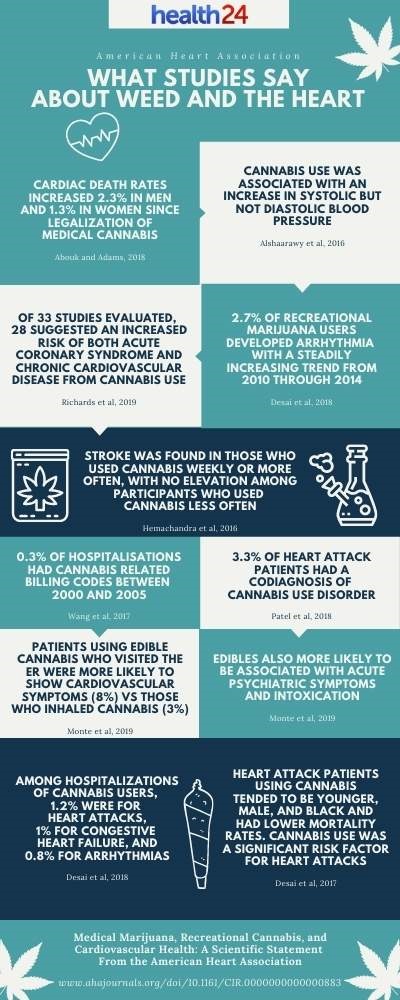- The American Heart Association released a comprehensive report on cannabis
- They state that more conclusive studies are needed on its effects on heart health
- While not against legalisation, they advocate for regulation similar to tobacco
The legalisation of cannabis for recreational consumption has been a hot topic over the last few years as more countries have started decriminalising it, including South Africa.
Here, private cultivation and consumption – but not the sale – of cannabis became legal in 2018, and while many promote its benefits, science hasn't had a lot of opportunity to study its effects, mainly because of legal issues.
The American Heart Association (AHA) recently released a scientific statement on the impact of the green herb on cardiovascular health, and the news is not great.
READ | Marijuana withdrawal is real, study shows
The makeup of cannabis
There are two main compounds harvested from cannabis – THC and cannabidiol (CBD) – which can have various effects on the brain and body. Cannabis is subdivided into marijuana and hemp. Marijuana is what causes a "high" and hemp is farmed for industrial use.
Marijuana is generally classified according to its THC and CBD ratio.
Marijuana, pot, weed or dagga is widely used around the world – legally or illegally – but what most concerns the AHA is the prevalence of marijuana use in young adults between the ages of 18 and 25.
Early use of cannabis has shown evidence of reduced cognitive functioning in teenagers, and increasing their susceptibility to mental health disorders in later years, as well as driving addiction to other substances.
Some of the medical benefits of cannabis that have been confirmed include pain reduction, enhancing appetite, fighting chemo-induced nausea, and reducing seizures in children.
The psychotropic effects of marijuana depend on how you take it.
"Because of increased systemic absorption, slower onset, and peak effect compared with smoked cannabis, edible consumption appears more likely to result in adverse effects, particularly psychiatric and cardiovascular, prompting acute medical care," write the authors.
READ MORE | More patients turning to medical marijuana for arthritis pain
How does cannabis affect the heart?
This can depend on whether the cannabis has higher THC or CBD levels.
THC can increase heart rate, its demand for oxygen, resting blood pressure, and the chance of a blood clot. It also affects the balance between free radicals and antioxidants in your body, and endothelial dysfunction, which is a coronary artery disease.
CBD, on the other hand, has the opposite effect. It reduces heart and blood pressure, helps endothelial dysfunction and can help inflammation in diabetics.
(Infographic: Gabi Zietsman/Canva)
Cannabis vs. tobacco
Regardless of THC and CBD levels, marijuana's negative effects increase when smoked. Compared to tobacco, the carbon-monoxide and tar inhalation from smoking marijuana is a lot higher, which impairs oxygen absorption in the body.
But the jury is still out on the question if smoking cannabis can trigger heart attacks or heartbeat irregularity, as well as increase cancer risk, like tobacco. There's also difficulty assessing this properly as most marijuana smokers also smoke tobacco, which confounds results.
And during the Covid-19 pandemic, where smokers have an increased risk of severe symptoms, it's impossible to assess whether this vulnerability extends to cannabis smokers.
The AHA however recommends that – in light of e-cigarette deaths caused by synthetic THC – cannabis vaping should be avoided.
READ | CBD medicine may help ease another form of seizure
Studies difficult to conduct
"Unfortunately, most of the available data are short term, observational, and retrospective in nature; lack exposure determination; exhibit recall bias; include minimal cannabis exposure with no dose or product standardisation; and typically evaluate low-risk cohorts."
There's also concern that THC content has gradually increased over the years as marijuana becomes more commercialised, and that earlier studies may therefore already be defunct.
This only highlights the urgent need for more intensive studies on the subject to better inform healthcare and the public on cannabis use.
Cannabis addiction is another factor that needs to be explored, where chronic use can lead to withdrawal symptoms if stopped suddenly.
"According to epidemiological studies, risk factors for [cannabis use disorder] include higher rates of edible consumption and vaping; higher THC potency and lower CBD content; and younger age at initiation."
What's the way forward
The AHA has a few recommendations for the future of cannabis: harmonising global laws; integrating it into existing control measures for tobacco; better education frameworks; and reducing barriers to research.
This includes a more balanced approach, leading to a better understanding of cannabis's negative effects, and avoiding overemphasising its benefits. The organisation isn't against legalisation, but instead calls for better regulation and standardised labelling that will be easy for the general public to understand.
"Meanwhile, the negative health implications of cannabis should be formally and consistently emphasised in policy, including a doubling down on the American Heart Association’s commitment to limiting all smoking and vaping, and banning cannabis use by youth."
READ MORE | Marijuana could be an option for migraine relief – but more studies are needed
Image credit:




 Publications
Publications
 Partners
Partners












